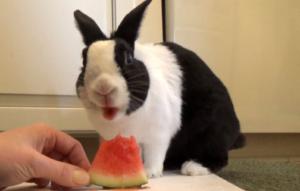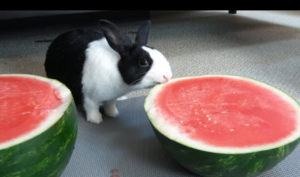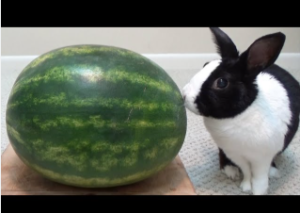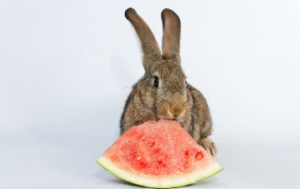Rabbits are curious little creatures with a natural inclination to nibble on anything that catches their interest. As pet owners, it’s essential to provide them with a healthy, balanced diet to keep them in good shape. But what about fruits like watermelon? Can rabbits eat watermelon safely, or is it better to keep this summer treat off their menu?
In this vet-approved guide, we’ll explore whether rabbits can eat watermelon, the potential benefits and risks, and how to safely incorporate it into their diet. We’ll also answer frequently asked questions to help you make informed decisions about your rabbit’s nutrition.
Can Rabbits Eat Watermelon?

Yes, rabbits can eat watermelon, but only in moderation. Watermelon is a safe and hydrating treat for rabbits, provided it is offered in small amounts and with proper precautions. The fruit’s high water content makes it refreshing, especially during hot weather, but its natural sugars can pose health risks if consumed excessively.
It’s essential to understand the nutritional value of watermelon and how it fits into a rabbit’s dietary needs before adding it to their diet.
You should know this too: Can Rabbits Eat Pumpkins?
Nutritional Value of Watermelon

Watermelon is mostly water, which makes it a great hydrating fruit. Here’s a breakdown of the nutritional components:
| Nutrient | Amount (per 100g) | Benefits for Rabbits |
| Water | 91.5g | Keeps rabbits hydrated |
| Vitamin C | 8.1mg | Supports immune health |
| Vitamin A | 28µg | Promotes healthy vision |
| Potassium | 112mg | Helps maintain proper muscle function |
| Fiber | 0.4g | Supports digestive health |
While watermelon provides hydration and small amounts of vitamins and minerals, it’s not a significant source of fiber, which is essential for a rabbit’s digestive health.
Benefits of Watermelon for Rabbits

When fed in moderation, watermelon can offer a few benefits to rabbits:
1. Hydration
- Watermelon is made up of over 90% water, making it an excellent way to keep your rabbit hydrated, especially in hot weather. Rabbits can be prone to dehydration, and a small piece of watermelon can help maintain their fluid intake.
2. A Refreshing Treat
- The natural sweetness of watermelon makes it a tasty treat that most rabbits enjoy. Offering it occasionally can keep your rabbit’s diet varied and interesting.
3. Contains Vitamins and Antioxidants
- Watermelon contains small amounts of vitamin C and vitamin A, which are beneficial for your rabbit’s immune system and overall health.
Risks of Feeding Watermelon to Rabbits

While watermelon can be a safe treat, there are some risks associated with feeding it to rabbits:
1. High Sugar Content
- Watermelon contains natural sugars that can be harmful to rabbits if consumed in large quantities. Excess sugar can lead to obesity, digestive issues, and dental problems.
2. Digestive Issues
- Rabbits have sensitive digestive systems that require a high-fiber diet. Watermelon is low in fiber and high in water, which can cause diarrhea or upset stomach if given in excess.
3. Choking Hazard from Seeds
- Watermelon seeds can pose a choking hazard to rabbits. Always ensure that the watermelon you offer is seedless or that you remove all seeds before feeding it to your rabbit.
4. Potential Pesticide Exposure
- Watermelons may be treated with pesticides, which can be harmful to rabbits. Always wash the fruit thoroughly before offering it to your pet.
How to Safely Feed Watermelon to Rabbits
If you decide to give your rabbit watermelon, follow these steps to ensure it’s safe:
Step 1: Choose Fresh, Ripe Watermelon
Select a fresh, ripe watermelon that is free from any signs of spoilage or mold.
Step 2: Wash the Watermelon Thoroughly
Wash the watermelon under running water to remove any dirt, bacteria, or pesticides.
Step 3: Remove Seeds and Rind
Cut the watermelon into small, bite-sized pieces. Remove all seeds and the rind before offering it to your rabbit. The rind is tough and can be difficult for rabbits to digest, while the seeds can pose a choking hazard.
Step 4: Offer a Small Portion
Start with a small piece (about a 1-inch cube) to see how your rabbit reacts. Observe them for any signs of digestive upset.
Step 5: Monitor Your Rabbit
Keep an eye on your rabbit after they eat watermelon. If they show signs of diarrhea or any other digestive issues, stop feeding it immediately.
How Often Can Rabbits Eat Watermelon?

Watermelon should be given as an occasional treat, not a regular part of your rabbit’s diet. Limit the serving to once or twice a week and only in small amounts.
The primary diet of a rabbit should consist of:
- Hay: 80-90% of their diet
- Fresh Vegetables: 10-15% of their diet
- Pellets: 5% of their diet
Treats, including fruits like watermelon, should make up less than 5% of their overall diet.
Frequently Asked Questions (FAQ)
1. Can Rabbits Eat Watermelon Rind?
No, it’s best to avoid feeding watermelon rind to rabbits. The rind is tough and difficult for them to digest and may contain pesticides.
2. Can Rabbits Eat Watermelon Seeds?
No, watermelon seeds should be removed before feeding the fruit to your rabbit. Seeds can pose a choking hazard.
3. Can Baby Rabbits Eat Watermelon?
It’s best to avoid giving watermelon to baby rabbits. Their digestive systems are still developing, and sugary fruits can cause digestive upset.
4. How Much Watermelon Can I Give My Rabbit?
Offer a small piece (about a 1-inch cube) once or twice a week. Avoid overfeeding to prevent digestive issues.
5. Can Rabbits Eat Other Fruits?
Yes, rabbits can eat other fruits in moderation. Safe fruits include:
- Apples (without seeds)
- Blueberries
- Strawberries
- Pears (in small amounts)
- Bananas (in moderation)
Always introduce new fruits gradually and observe your rabbit for any adverse reactions.
Conclusion
Watermelon can be a safe and refreshing treat for rabbits when offered in moderation. It provides hydration and a small boost of vitamins, but its high sugar content means it should never replace their primary diet of hay, fresh vegetables, and pellets.
By following the guidelines in this article, you can safely treat your rabbit to a bite of watermelon while keeping their health and well-being in mind. Remember, moderation is key, and always consult with a veterinarian if you have concerns about your rabbit’s diet.
